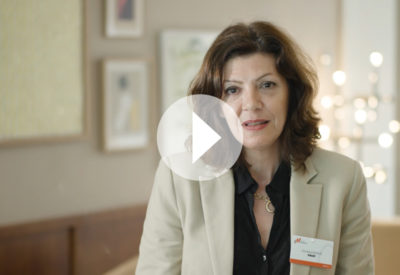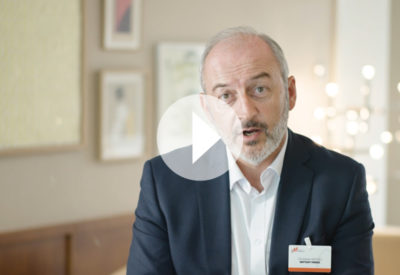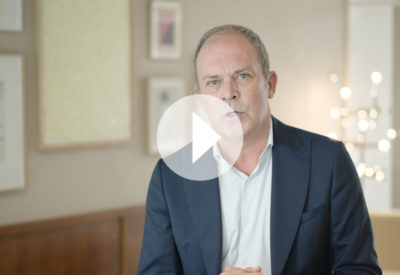Soitec: industrial performance to boost business recovery
Cyril Menon's testimony
Soitec's directors needed courage, innovation and industrial intuition to make the company what it is today: a leader in the mobility market and a technological standard bearer.
Soitec supplies innovative materials for a complete range of electronic applications in the mobility sector, including smart phones, connected devices, tablets, and electronic components in cars. It mainly operates in international markets.
But in 2013, the twenty-year-old company saw its revenues halved and its margins collapse. Cyril Menon, now Director of Industrial Operations, explains why: "Our markets weren't sufficiently diversified; to rectify this, the company invested heavily in solar but the business didn't take off and we were left with some serious overheads. When one of our clients pulled out, we were faced with a sharp drop in revenues, combined with liquidity problems."
To get back on its feet and to salvage what it could, the former 1990s start-up slashed its costs, reducing its payroll from 1,600 to 850 through two successive job-protection plans in Europe, the United States and Singapore; the solar business was also wound up, and a new leadership team took the helm in early 2015.
In the midst of a major crisis, how do you restore employee confidence and engagement ?
Although the situation was worrying it was far from desperate. Soitec had two key products that the company's directors knew would carry substantial weight in the connected devices sector - RF-SOI and FD-SOI.
"We knew these products were going to be growth drivers, there was no doubt about it. We just needed to find a way of putting them into production."
Although the company's resources and room for manoeuvre were limited they did have some rope to play with: Soitec's teams grabbed it with both hands, driven by their shared values and a genuine affection for the company.
3 key levers to improve industrial performance
In this kind of situation, you have to revise your whole approach to production and effect "a real revolution in operational culture" in order to move from control management, based on indicators produced retroactively, to management that empowers each individual in their work role. "We implemented Short Interval Management (SIM) to restore shop-floor leadership, along with Kaizen workshops to involve employees in the continuous improvement process, methods and tools to weed out activities with no added value, and management tools to improve real-time performance."
Building the production capacity of 200mm RF-SOI products was also a key factor. "The market was growing and this was an opportunity we simply couldn't miss, so we went into AGILE, AUTONOMOUS and VISIBLE project mode. The suggestions for improvement came from our teams." And it worked: although the project aimed at increasing its capacity by 30% in two years, it actually increased by 70% in 3 years.
"Because of our liquidity problems, we focused on optimising our processes and improving our machines rather than buying new equipment, which generated investment savings of 70%."
The third lever involved redistributing everyone's roles on each item of equipment. "We knew that skills were important to develop our industrial project, secure the company's long-term future and improve the outlook for employees, so it was vital to prepare for this phase long in advance, from 2013, even though we were in the middle of the crisis."
Increasing operator autonomy
This is where the teams from Quaternaire came in, as part of an approach called Autonomous Production Interventions (API).
The project's premises and goals focused on improving operator maintenance and process skills so that technicians could focus on enhancing tool reliability and continuous improvement actions, releasing engineers to work on processes and their industrialisation.
"This goal was shared by the whole operations management team. Nevertheless, to implement the project, we needed an outside point of view to help us fine-tune our vision and compare it with the experiences of other companies."
"So we met other Quaternaire clients with a similar background and goals as ourselves. Our discussions with the teams from Armor Group were particularly useful because they allowed us to gain some perspective and look ahead to a better-performing model."
A series of structuring phases followed, including a task transfer analysis, the definition of standards that would not negatively impact on the company's agility, the identification of obstacles, the development of a qualification-based programme to promote peer recognition, and the implementation of mechanisms to get employees on board, involve them and ensure full ownership of the approach.

The approach involved all of the company's actors. "This participatory model helped us identify and then overcome certain obstacles." This included the capacity of operators to perform maintenance actions during production peaks: "This warning enabled us to avoid a serious stumbling block… In this particular instance, we adjusted our staffing levels from the training period onwards: at the same time, we knew that we would need to increase our production capacity, so we simply got a head start."

Twenty-one people took part in the training, which operators can use to develop the same skills as maintenance technicians: "This is of no small importance in a technological industry like semi-conductors, where it takes time to gain expertise." The course - basic API training provided by Quaternaire, an in-depth introduction to Soitec's processes and maintenance departments, and external technical training - is long and requires investment. It is certified by the awarding of accreditation recognised under the metallurgy convention governing labour rights in the sector, but not exclusively.
"We attach great importance to recognising skills within the company: each diploma is presented at an official ceremony; these moments of celebration and others enable us to bring the approach to life and establish it firmly in our corporate culture."
Every month, in each team's API cell, the API operator, the maintenance technician, the processes technician and the line manager discuss achievements, problems and equipment changes: "These meetings reflect the new mind-set at Soitec; operators are involved in the discussions, help to continuously improve equipment, and supplement their training as a result."
Soitec has now achieved its goal… The indicators speak for themselves: production costs have been halved, products and clients have been diversified, and operating margins have increased by 20%. The company is also building on its human resources to safeguard growth: it has managed to maintain and develop its key skilled employees and implement an empowering organisation that promotes continuous improvement. It now needs to keep up the momentum.
Soitec
World leader in the production of advanced substrates, with 850 employees based in Europe, the United States and Asia, Soitec designs and produces innovative semiconductor materials that allow manufacturers of electronic components to miniaturize chips, boost their performance and reduce their energy consumption.
Front page !

Knauf France: CEO's testimony
Christine Muscat, CEO of Knauf France, talks about the multi-site operational excellence project deployed at 23 of the group's sites.

Brittany Ferries: CEO's testimony
Christophe Mathieu, CEO, talks about the performance-based purchasing approach launched by Brittany Ferries with the creation of a purchasing department

Crédit Agricole Sud Méditerranée: CEO's testimony
Nicolas Tavernier, CEO, talks about the construction of Crédit Agricole Sud Méditerranée's new corporate project and its operational support.


